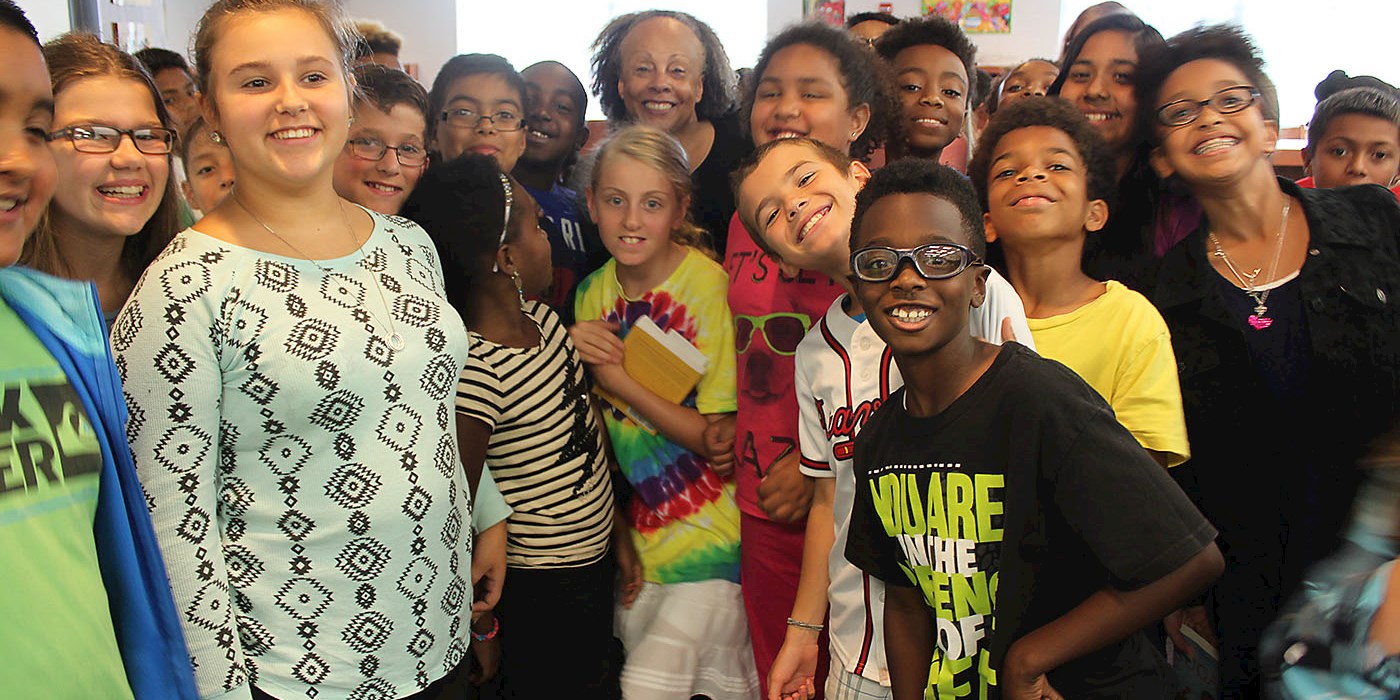In an elementary school classroom, author Jewell Parker Rhodes holds up her book “Bayou Magic,” a story about the BP oil spill and mythic African mermaids who accompanied slaves to the New World.
Rhodes is black. The students are white. The school is affluent and has an auditorium, computers, smart boards, a well-stocked library and experienced teachers. As they talk, the students who’ve read the book beforehand, describe her black protagonist, Maddy, as beautiful and strong. The school has had numerous author visits.
Rhodes visits another classroom, where all of the students are black. The author visit — the school’s first — takes place in a cafeteria. The school has no technology, no books, inexperienced teachers and the students live in a low-income, hyper-segregated community. The children love hearing Rhodes talk about Louisiana and black mermaids. A third grader raises his hand: “Why do white people hate us?”
It’s disconnects like this that Rhodes, an alumna of Carnegie Mellon University, has spent her life trying to bridge, by writing stories that promote harmony and denounce the divisions of race and class.
“America continues to have significant racial disparities in school funding and excellence. This creates chasms between world views and social mobility,” Rhodes said. “Children can learn resilience, empathy, tolerance and hope through books but only if a school has funding to buy books and experienced teachers to highlight inclusivity, multi-ethnic perspectives.”
Rhodes grew up in Pittsburgh. Although neither of her parents finished high school, she was academically nurtured in a Catholic school and by a drama teacher who suggested she attend CMU. Funded by a Mellon scholarship and $50 a month from her family, she was accepted in the Drama Department’s Musical Theater program.
One afternoon in CMU’s Hunt Library, she pulled from the shelf “Corregidora” by Gayle Jones. It was the first time she’d come across a book by a person of color. And it became the first time she thought of writing as a career option. She switched from drama to English.
Rhodes earned her bachelor’s degree in 1975, her master’s degree in 1976 and her doctorate in 1979, all from CMU. She recalls CMU professors, particularly, Jan Cohn, who “nurtured my African-American voice as being both specific and universal.”
Striving for Excellence
In 1993, she wrote the novel “Voodoo Dreams,” which brings to life Marie Laveau, a legendary 19th-century voodoo priestess. It won a National Endowment for the Arts Fiction Award.
The Arizona State University creative writing professor has written six adult novels as well as an award-winning children’s Louisiana trilogy that includes “Ninth Ward,” “Sugar” and “Bayou Magic.” Her newest book “Towers Falling” (Little, Brown Books for Young Readers, July 2016) is the story of a homeless African-American girl, a Muslim and the son of an Iraq War veteran — all fifth graders learning about 9/11.
For Rhodes, these characters represent the fabric of America, coming together to understand how each of their stories is influenced by history
“Through friendship and an interdisciplinary curriculum, the students learn that history is relevant. Alive. Personal,” she said. “They reaffirm that America’s founding principles of equality, liberty, justice and religious freedom must continue to guide our society during tragic times.”
It’s through such understanding that she hopes no child will ever again ask: “Why do white people hate us?”
Rhodes said she writes for that understanding and fervently believes minority voices like hers need to be heard, especially when taking into account that, according to the Cooperative Children’s Book Center, of the 3,400 children’s books published in 2015, only 269 were stories about African-Americans. Of those, 106 were by African-Americans.
If we want our children to help make America more livable and just, Rhodes said she believes they have to experience diversity, in life and in literature.
“No one should feel less than. Ever,” she said. “All are included, none excluded, and everyone’s story is as important as any other’s. The more narrative threads we add — the rainbow threads, the diverse threads — the more American we become.”
Words to live by.
Footnotes
Caption: Rhodes (center back), at one of her elementary classroom visits, where she promotes harmony and denounces the divisions of race and class.




